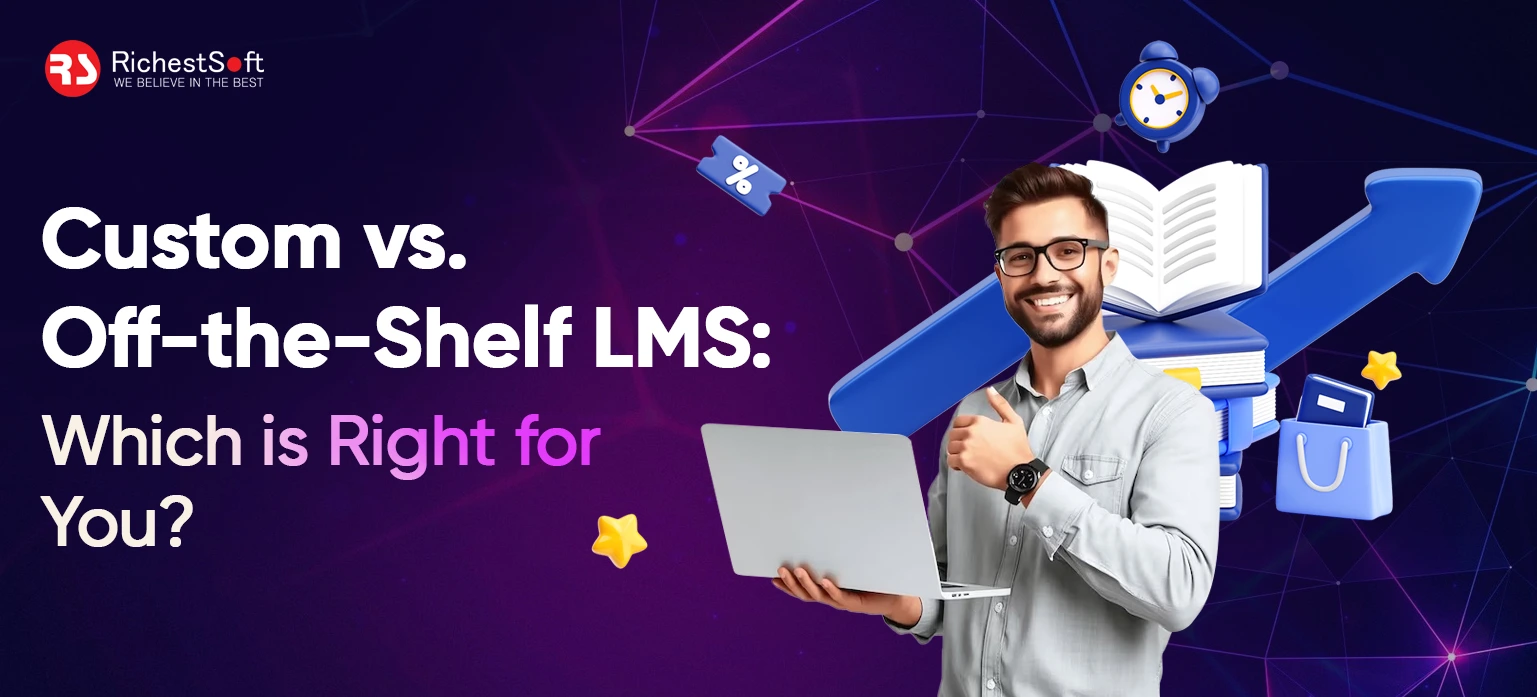May 12, 2025
Choosing the right Learning Management System (LMS) can make or break your business training and development strategy. But here’s the challenge: with so many LMS options, how do you know which is best for your business? You’re likely facing the classic debate: Custom vs. Off-the-Shelf LMS.
On the one hand, you have custom LMS platforms built from scratch to match every requirement. On the other side, there are off-the-shelf LMS systems—ready-made, quick to deploy, and packed with general features. Each has its pros, cons, and ideal use cases. But which aligns with your goals, budget, and long-term strategy?
This article will help you find out. Whether you’re a growing startup or an established enterprise, we’ll walk you through each option in simple language. You’ll learn how these two LMS types stack up in terms of cost, setup time, flexibility, security, and long-term value so you can make a confident, informed choice.
What is an LMS?
Studies show that 94% of employees stay at a company longer if it invests in their learning and development. An LMS software application manages, delivers, and tracks training or learning programs. Companies use it for employee training, schools for classes, and organizations for onboarding.
There are two main types:
- Custom LMS: Built from scratch to fit your company’s exact needs.
- Off-the-Shelf LMS: Ready-made software you can buy and start using quickly.
What Is a Custom LMS and When Should You Consider It?
A Custom LMS is created specifically for your business goals. Software developers customize it with features and designs that meet your company’s needs.
Pros of Custom LMS:
- Personalized Experience: Only includes the features you want.
- Flexible Integration: Works well with your other tools.
- Unique Branding: Matches your organization’s style.
- Scalability: Can grow with your business.
- Better Security: You manage data and privacy settings.
Cons of Custom LMS:
- Higher Initial Cost: It requires a bigger investment upfront.
- Longer Development Time: It usually takes several weeks or months to complete.
- Ongoing Maintenance: Needs a tech team for updates.
Best For:
- Medium to large businesses with special training needs.
- Companies that have specific workflows or branding needs.
- Organizations that require high security and custom reporting.
What Is an Off-the-Shelf LMS and When Should You Choose It?
An Off-the-Shelf LMS is a ready-made platform with common training features. You can buy it online and start using it almost immediately.
Pros of Off-the-Shelf LMS:
- Quick Setup: You can use it in a few hours or days.
- Lower Initial Cost: No need to spend money on development.
- Pre-Built Features: Includes tools for managing users, creating reports, and courses.
- Ongoing Support: The vendor takes care of updates and support.
Cons of Off-the-Shelf LMS:
- Limited Customization: It may not fit all your specific needs.
- Extra Costs: You might pay for features you don’t use.
- Branding Restrictions: Making it look like your brand can be hard.
- Integration Issues: It may not work smoothly with your other tools.
Best For:
- Small businesses with general training needs.
- Companies looking for quick and affordable solutions.
- Startups with limited resources and short-term training goals.
Detailed Comparison: Custom vs. Off-the-Shelf LMS

1. Development Time
- Custom LMS: This type of LMS takes several weeks or even months to build because it’s made from scratch to fit your needs.
- Off-the-Shelf LMS: Ready to use immediately or within a few days.
2. Cost
- Custom LMS: Higher one-time cost at the beginning. It’s an investment.
- Off-the-Shelf LMS: Lower initial cost, but monthly or yearly fees may increase.
3. Features
- Custom LMS: You choose the features you want. Nothing extra, nothing missing.
- Off-the-Shelf LMS: Comes with many built-in features. Some may not be useful to you, and some you need might be missing.
4. Branding
- Custom LMS: Fully matches your company’s brand, logo, and colors.
- Off-the-Shelf LMS: Limited options to change the look and feel.
5. Integration with Other Tools
- Custom LMS: It can be built to easily connect with your HR, payroll, CRM, or any other internal systems.
- Off-the-Shelf LMS: May or may not integrate well with your tools. Might need extra effort.
6. Security & Data Control
- Custom LMS: You have full control over data storage and security settings.
- Off-the-Shelf LMS: Data is managed by the vendor, with less control over security and privacy.
7. Scalability
- Custom LMS: Easily scalable as your business grows. You can add more features anytime.
- Off-the-Shelf LMS: Limited scalability. You might have to upgrade plans or switch systems later.
8. Maintenance
- Custom LMS: You or your tech team must maintain and update the system.
- Off-the-Shelf LMS: The vendor handles updates, fixes, and bugs.
9. Reports and Analytics
- Custom LMS: You can build custom reports tailored to your KPIs and training goals.
- Off-the-Shelf LMS: Standard reports are available. Advanced insights may be limited or locked behind higher plans.
10. Ownership
- Custom LMS: You fully own the system. You can use, change, or move it anytime.
- Off-the-Shelf LMS: You are renting the service. If you cancel, you may lose access to data or content.
How to Choose an LMS System for Your Organization
Choosing the right Learning Management System (LMS) is a big decision for any organization. It impacts how your team learns and performs. Here are the main points to think about when picking the best LMS for your needs, explained:
Identify Your Training Goals and Needs
Before selecting an LMS, ask yourself: What do we want to achieve? Do we want to train employees, help new staff start, or educate customers? Knowing your goals will help you determine what features and content are necessary. For example, a custom LMS might be better if your training is complicated and needs detailed tracking. If your training is simple, a ready-made LMS could work well.
Understand Your Audience and Their Technical Skills
Think about who will use the LMS. Are they comfortable with technology, or do they need something straightforward? A good LMS should fit your audience’s skills. For instance, the LMS should be easy to use if your users are older or not tech-savvy. If your workforce is remote, you might also want features like support for different languages or learning on mobile devices.
Check Integration with Existing Systems
Consider how the LMS will work with your tools, like HR systems or payroll software. If you use tools like Slack or Zoom, it’s useful if your LMS can connect with them. A custom LMS lets you fully control integrations, but many off-the-shelf LMSs offer easy connections. Choose based on how much flexibility you need.
Define Your Budget
Your budget is an important factor. A custom LMS usually costs more initially, but it is a long-term investment you own completely. In contrast, an off-the-shelf LMS is cheaper initially but might charge monthly or per user. Consider your costs not just for now, but over the next 3 to 5 years, including any extra fees for upgrades or storage.
How RichestSoft Can Help You
Many businesses struggle with choosing the right Learning Management System (LMS). The wrong one can waste time, increase costs, and lead to a bad learning experience. However, choosing the right LMS can improve productivity, enhance training outcomes, and save money over time. That’s why making a smart choice with expert help is important.
At RichestSoft, we don’t just create learning platforms; we help you choose the right LMS from the beginning. Whether you need a custom LMS that fits your specific needs or a simple and affordable off-the-shelf LMS, our team will explain the options clearly. We consider your goals, team size, features needed, and Learning Management System Cost to find the best solution for you without any confusion.
Conclusion
Choosing between a Custom vs. Off-the-Shelf LMS isn’t just a technical choice; it’s a smart one. A custom LMS gives you complete control, great flexibility, and long-term benefits, especially if you have special training needs or want to grow. In contrast, a ready-made LMS is quick to use, simple, and costs less upfront, making it perfect for businesses that want to start fast with basic features.
Whatever you choose, the key is ensuring your LMS fits your goals, team, and budget. You don’t have to do it alone. At RichestSoft, we help you compare options, figure out the real LMS cost, and choose or create the best solution that gets results.
 +1 315 210 4488
+1 315 210 4488 +91 99888 06489
+91 99888 06489









